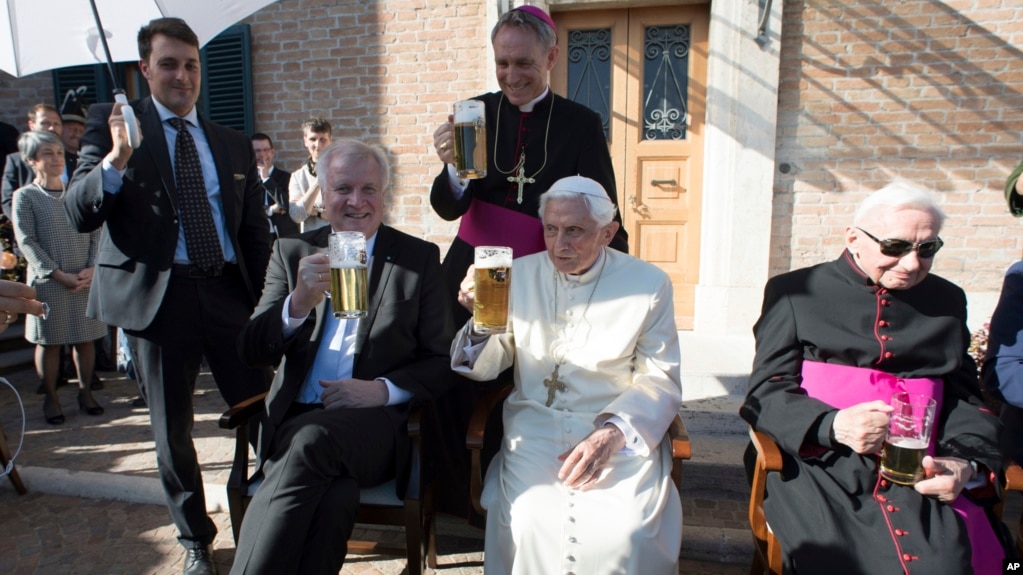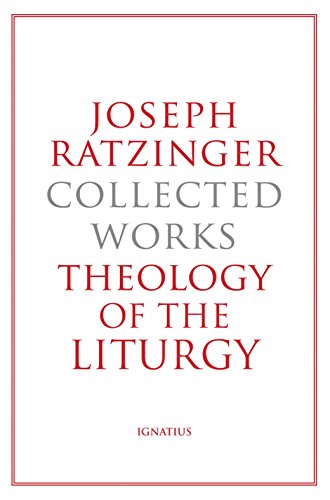
April 19, 2017
March 15, 2017
April 18, 2017

March 27, 2017
September 15, 2016
Pope Benedict approved the mistake of the International Theological Commission, a magisterial error on a faith issue which contradicted the ex cathedra teaching of three Church Councils and popes
June 22, 2016
September 14, 2016
International Theological Commission made a mistake
International Theological Commission made a mistake
Friday, July 15, 2011
OUR POPE IS A CUSHINGITEhttp://eucharistandmission.blogspot.it/2011/07/our-pope-is-cushingite.html#links
Wednesday, May 18, 2011
THE HOLY FATHER POPE BENEDICT XVI IS A CUSHINGITEhttp://eucharistandmission.blogspot.it/2011/05/holy-father-pope-benedict-xvi-is.html#links
Friday, February 22, 2013
MAJOR THEOLOGICAL ERROR WILL MARK THE PONTIFICATE OF POPE BENEDICT XVI
http://eucharistandmission.blogspot.it/2013/02/major-theological-error-will-mark.html#links
OUR POPE IS A CUSHINGITEhttp://eucharistandmission.blogspot.it/2011/07/our-pope-is-cushingite.html#links
Wednesday, May 18, 2011
THE HOLY FATHER POPE BENEDICT XVI IS A CUSHINGITEhttp://eucharistandmission.blogspot.it/2011/05/holy-father-pope-benedict-xvi-is.html#links
Friday, February 22, 2013
MAJOR THEOLOGICAL ERROR WILL MARK THE PONTIFICATE OF POPE BENEDICT XVI
http://eucharistandmission.blogspot.it/2013/02/major-theological-error-will-mark.html#links
July 5, 2012
APRIL 7, 2014
Cardinal Luiz Ladaria S.J and Pope Benedict XVI made a factual error : Analysis
http://eucharistandmission.blogspot.it/2014/04/cardinal-luiz-ladaria-sj-and-pope.html
September 1, 2012
POPE BENEDICT XVI MAKES THE RICHARD CUSHING ERROR AND ASSUMES VATICAN COUNCIL II CONTRADICTS THE SYLLABUS OF ERRORS
October 27, 2013
Archbishop Lefebvre was correct in rejecting Vatican Council II(Cushingism version): the Magisterium was not aware of the false premise during the excommunication
June 19, 2013
Even Pope Benedict XVI made the Richard Cushing Error
INTERNATIONAL THEOLOGICAL COMMISSION USES PREMISE THAT IS FACTUALLY INCORRECT : LIMBO
http://eucharistandmission.blogspot.it/2012/03/international-theological-commission_29.html
The International Theological Commission's position paper Christianity and the World Religions 1997 has an objective factual error and is approved by Cardinal Joseph Ratzinger : invincible ignorance is not an exception to the dogma extra ecclesiam nulla salushttp://eucharistandmission.blogspot.it/2012/03/international-theological-commissions.html
INTERNATIONAL THEOLOGICAL COMMISSION ASSUMES ‘SEEDS OF THE WORD’ (VATICAN COUNCIL II ) IN OTHER RELIGIONS ARE KNOWN TO US AND THIS IS AN EXPLICIT EXCEPTION TO THE DOGMA EXTRA ECCLESIAM NULLA SALUShttp://eucharistandmission.blogspot.it/2012/03/international-theological-commission.html
VATICAN'S INTERNATIONAL THEOLOGICAL COMMISSION MAKES AN ERROR IN ITS POSITION PAPER CHRISTIANITY AND THE WORLD RELIGIONShttp://eucharistandmission.blogspot.it/2012/03/vaticans-international-theological.html
VATICAN COUNCIL II(Feeneyite) REJECTS THE THEOLOGY OF RELIGIONShttp://eucharistandmission.blogspot.it/2012/03/vatican-council-ii-rejects-theology-of.html
Former Secretary of the International Theological Commission holds that those saved with the baptism of desire and in invincible ignorance are known to us and so an exception to the dogma extra ecclesiam nulla salushttp://eucharistandmission.blogspot.it/2012/02/secretary-of-international-theological.html#links
BISHOP GERHARD MULLER MADE TWO FUNDAMENTAL MISTAKES ON VATICAN COUNCIL II: HE ASSUMED LG 16 CONTRADICTS EXTRA ECCLESIAM NULLA SALUS AND HE DID NOT KNOW AG 7 SUPPORTS THE DOGMAhttp://eucharistandmission.blogspot.it/2012/07/bishop-gerhard-muller-made-two.html#links
Archbishop Augustine Di Noia says the Holy Spirit preserves the Church from error including the interpretation of Vatican Council II- we now know there are two interpretations of Vatican Council II, which one is guided by the Holy Spirit ?http://eucharistandmission.blogspot.it/2012/07/archbishop-augustine-di-noia-says-that.html#links
Factual error approved by popes
Popes approved a factual error and so Vatican Council II is a break with the past http://eucharistandmission.blogspot.it/2014/04/popes-approved-faual-err-and-so.html
Wednesday, July 4, 2012
CDF THERE ARE TWO INTERPRETATIONS OF VATICAN COUNCIL II - YOURS IS THE FALSE ONE http://eucharistandmission.blogspot.it/2012/07/cdf-there-are-two-intrpretations-of.html#links
REPORT IS AN EXPOSE OF APOSTASY AT THE HIGHEST LEVELS OF THE CHURCH-ROBERT SUNGENIS
http://eucharistandmission.blogspot.it/2011/02/report-is-expose-of-apostasy-at-highest.html
DID THE POPE REALLY DENY THE FAITH ON THE NEED FOR JEWS TO CONVERT ?http://eucharistandmission.blogspot.it/2012/04/did-pope-really-deny-faith-on-need-for.html#links
CDF CLARIFIES COMMENT ON CONDOMS BUT NOT JEWS : POPE CONTRADICTS BIBLEhttp://eucharistandmission.blogspot.it/2010/12/cdf-clarifies-comment-on-condoms-but.html#links
POPE SAYS REVISED GOOD FRIDAY PRAYER IS NOT FOR THE CONVERSION OF THE JEWS ? EARTHQUAKE SHIFT IN CATHOLIC TEACHING ? http://eucharistandmission.blogspot.com/2010/12/pope-says-revised-good-friday-prayer-is.html
Pope Benedict XVI’s objective,factual error in Light of the World(Ignatius) p.107 is contributing to widespread liberalism and dissent in the Catholic Church.http://eucharistandmission.blogspot.it/search/label/Light%20of%20the%20World
HOLY FATHER ASSUMES THOSE SAVED IN INVINCIBLE IGNORANCE ARE KNOWN TO US: CONTRADICTS VATICAN COUNCIL I AND II http://eucharistandmission.blogspot.it/2012/04/holy-father-assumes-those-saved-in.html
HOLY FATHER MAKES AN OBJECTIVE ERROR IN WRITING http://eucharistandmission.blogspot.it/2012/04/holy-father-makes-objective-error-in.html
ANIVERSARY OF THE DENIAL OF THE FAITH BY THE MAGISTERIUM ? http://eucharistandmission.blogspot.it/2012/04/aniversary-of-denial-of-faith-by.html
July 15, 2011
February 4, 2011
DOES THE POPE REALLY SAY IN LIGHT OF THE WORLD THAT JEWS DO NOT HAVE TO CONVERT IN THE PRESENT TIMES ? http://eucharistandmission.blogspot.it/2011/02/does-pope-really-say-in-light-of-world.html
July 21, 2011
Franciscans of the Immaculate are being forced to accept the papal error
http://eucharistandmission.blogspot.it/2014/04/franciscans-of-immaculate-are-being.html#links
Pope Benedict XVI’s objective,factual error in Light of the World(Ignatius) p.107 is contributing to widespread liberalism and dissent in the Catholic Church.http://eucharistandmission.blogspot.it/search/label/Light%20of%20the%20World
Msgr. Guido Pozzo could announce Vatican Council II agrees with literal interpretation of dogma extra ecclesiam nulla salus while Nostra Aetate says Catholics are the ‘new people of God’ : pope made an error in Light of the World- all this is relevant to the Vatican-SSPX differences http://eucharistandmission.blogspot.it/2012/04/msgr-guido-pozzo-could-announce-vatican.html
CATHOLIC NEWS BLACK OUT ON BAGNASCO-RABBI DEALhttp://eucharistandmission.blogspot.it/2009/09/catholic-news-black-out-on-bagnasco.html#links
RABBIS WHO MET WITH CARDINAL ANGELO BAGNASCO ORIENTED TO HELL INDICATES VATICAN COUNCIL IIhttp://eucharistandmission.blogspot.it/2009/10/rabbis-who-met-with-cardinal-angelo.html#links
CARDINAL BAGNASCO DENIES JESUS AND THE CHURCHhttp://eucharistandmission.blogspot.it/search/label/Cardinal%20Angelo%20Bagnasco
Msgr. Guido Pozzo could announce Vatican Council II agrees with literal interpretation of dogma extra ecclesiam nulla salus while Nostra Aetate says Catholics are the ‘new people of God’ : pope made an error in Light of the World- all this is relevant to the Vatican-SSPX differences http://eucharistandmission.blogspot.it/2012/04/msgr-guido-pozzo-could-announce-vatican.html
CATHOLIC NEWS BLACK OUT ON BAGNASCO-RABBI DEALhttp://eucharistandmission.blogspot.it/2009/09/catholic-news-black-out-on-bagnasco.html#links
RABBIS WHO MET WITH CARDINAL ANGELO BAGNASCO ORIENTED TO HELL INDICATES VATICAN COUNCIL IIhttp://eucharistandmission.blogspot.it/2009/10/rabbis-who-met-with-cardinal-angelo.html#links
CARDINAL BAGNASCO DENIES JESUS AND THE CHURCHhttp://eucharistandmission.blogspot.it/search/label/Cardinal%20Angelo%20Bagnasco
CATHOLIC PRIESTS CORRECT POPE BENEDICT'S MISTAKE : WE DO NOT KNOW ANY CASE OF A NON CATHOLIC SAVED IMPLICITLY BY JESUS AND THE CHURCH SO IT DOES NOT CONTRADICT CANTATE DOMINO,COUNCIL OF FLORENCE
April 18, 2012
POPE CONTRADICTS BIBLE, CARDINAL LEVADA ISSUES NO CLARIFICATION. EXPECTS OFFICAL CLARIFICATION FROM BISHOP FELLAY http://eucharistandmission.blogspot.it/2012/04/pope-contradicts-bible-cardinal-levada.html
_____________________________________










